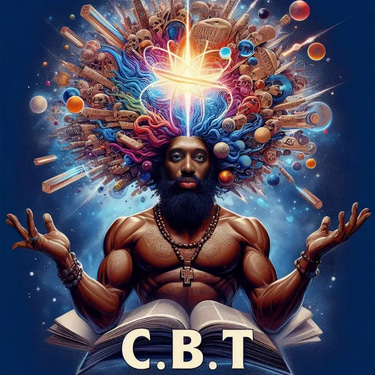The Emergence and Evolution of Young Earth Creationism: A Historical and Critical Examination
Blog post description.
James Cassel
1/16/20245 min read


INTRO TO YOUNG EARTH CREATIONISM
Young Earth Creationism, often referred to as YEC, is a religious belief system that asserts that the Earth is relatively young, with an age of approximately 6,000 to 10,000 years. This perspective stands in contrast to mainstream scientific understanding, which posits an Earth that is approximately 4.5 billion years old. In this article, we will explore the history and development of Young Earth Creationism, examining its roots, early proponents, the influence of religious beliefs, the impact of scientific discoveries, the rise of Young Earth Creationist organizations and institutions, controversies and debates surrounding this belief system, modern-day adherents, as well as criticisms and challenges it faces.
The Roots of Young Earth Creationism
The roots of Young Earth Creationism can be traced back to ancient religious texts, particularly the Bible. Many adherents of Young Earth Creationism interpret the creation account in the book of Genesis quite literally, believing that the Earth and the entire universe were created in six literal 24-hour days. This literal interpretation forms the foundation of their belief system, as they understand the biblical genealogies and timelines to calculate the age of the Earth.
Early Proponents of Young Earth Creationism
Throughout history, there have been notable figures who advocated for a young Earth. One such proponent was Archbishop James Ussher, an Irish cleric who, in the 17th century, calculated that the creation of the Earth occurred in the year 4004 BC. His work, "The Annals of the World," became influential among those who supported the concept of a young Earth.
Another significant contributor to Young Earth Creationism was George McCready Price, an early 20th-century Seventh-day Adventist writer and theologian. Price's book, "The New Geology," argued against the prevailing scientific theories of his time, proposing instead a literal interpretation of the Genesis account.
The Influence of Religious Beliefs on the Development of Young Earth Creationism
Religious beliefs have played a pivotal role in the development and perpetuation of Young Earth Creationism. Many adherents consider the Bible to be the infallible word of God, and therefore, any scientific evidence that contradicts a young Earth is seen as incompatible with their religious convictions. The belief that God created the Earth in a short period of time is deeply ingrained in their faith, leading them to reject the findings of mainstream science.
Furthermore, religious communities and institutions have provided a supportive environment for the growth of Young Earth Creationism. Churches, religious schools, and organizations have actively promoted this belief system, fostering a sense of community among adherents and reinforcing their conviction in a young Earth.
The Impact of Scientific Discoveries on Young Earth Creationism
Over time, scientific discoveries have presented challenges to the Young Earth Creationist worldview. The development of radiometric dating techniques, for instance, has allowed scientists to accurately estimate the age of rocks and minerals. These dating methods consistently indicate an Earth that is billions of years old, contradicting the young Earth timeline proposed by Young Earth Creationists.
Despite this, many Young Earth Creationists reject radiometric dating methods, claiming that they are flawed or based on faulty assumptions. Instead, they often propose alternative explanations, such as accelerated nuclear decay, as a means to reconcile their beliefs with scientific evidence.
The Rise of Young Earth Creationist Organizations and Institutions
In the 20th century, Young Earth Creationism gained momentum with the establishment of various organizations and institutions dedicated to promoting this belief system. One of the most prominent examples is the Creation Research Society (CRS), founded in 1963. The CRS conducts scientific research based on Young Earth Creationist principles and publishes its findings in journals and other publications.
These organizations and institutions provide a platform for Young Earth Creationist scientists to engage in research, publish their work, and present their ideas to the broader community. They also organize conferences and events where like-minded individuals can gather to discuss and reinforce their beliefs.
Controversies and Debates Surrounding Young Earth Creationism
Young Earth Creationism has been the subject of numerous controversies and debates, particularly in the realm of education. Some proponents of Young Earth Creationism advocate for its inclusion in science curricula, alongside or as an alternative to evolutionary theory. This has sparked heated debates, as critics argue that teaching Young Earth Creationism in a science classroom blurs the line between science and religious belief.
Legal battles over the teaching of Young Earth Creationism in public schools have also arisen. The U.S. Supreme Court case Edwards v. Aguillard in 1987 ruled that teaching creationism, including Young Earth Creationism, as a scientific alternative to evolution in public schools violated the First Amendment's Establishment Clause.
Modern-Day Young Earth Creationism and Its Adherents
Despite the controversies and legal challenges, Young Earth Creationism continues to be embraced by a significant number of individuals and organizations around the world. In the United States, organizations like Answers in Genesis and the Institute for Creation Research attract widespread support and maintain active online platforms.
Adherents of Young Earth Creationism come from diverse backgrounds and professions, including scientists, theologians, educators, and laypersons. They seek to reconcile their religious beliefs with what they perceive as scientific evidence supporting a young Earth. Their commitment to this perspective remains steadfast, despite the overwhelming consensus among the scientific community that the Earth is billions of years old.
Criticisms and Challenges to Young Earth Creationism
Young Earth Creationism faces numerous criticisms and challenges from both the scientific community and skeptics. One of the main criticisms is the lack of empirical evidence and the rejection of scientific consensus. The overwhelming majority of scientific disciplines, including geology, cosmology, and biology, support the idea of an ancient Earth and universe. Young Earth Creationism, on the other hand, relies heavily on biblical interpretation and religious beliefs, which are not subject to the same empirical scrutiny.
Another challenge to Young Earth Creationism is the perceived incompatibility with the theory of evolution. While Young Earth Creationists reject the notion of common descent and believe in a literal interpretation of the creation account, the scientific community widely accepts evolution as the cornerstone of modern biology. This fundamental disagreement has led to ongoing debates and conflicts between the two perspectives.
Conclusion: The Ongoing Debate and Future of Young Earth Creationism
The debate between Young Earth Creationism and mainstream scientific understanding of the Earth's age and origin shows no signs of resolution. As scientific knowledge continues to expand and new discoveries are made, Young Earth Creationism will face ongoing challenges to its claims. However, the deeply held religious convictions and the sense of community provided by Young Earth Creationist organizations and institutions ensure that this belief system will persist.
In the future, the discussion surrounding Young Earth Creationism may evolve, with new voices and perspectives contributing to the conversation. It is essential to approach this debate with open-mindedness, respect, and a commitment to understanding different viewpoints. Only through respectful dialogue can progress be made in bridging the gap between conflicting beliefs and finding common ground in the pursuit of knowledge and understanding.
CTA: Unlock the secrets of our shared genetic heritage and journey through the fascinating world of Faith and Science. Sign up now to delve into thought-provoking articles, exclusive insights, and stay connected with the latest discoveries. Begin your exploration and discovery – subscribe today!
